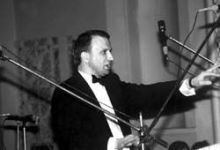On September 30th composer Volodymyr Runchak conducted the Kyiv Chamber Orchestra in a program of Shukh, Part, Gubaidulina and his own Chamber Symphony No. 1 in memory of Borys Lyatoshynskyi (1985) at the National Philharmonia.
At 45, Runchak is simply one of the most talented and most successful composers in Ukraine today. His music is overwhelmingly powerful, emotional, avant-garde, but at the same time so beautiful and intelligible to the listener. Still in the 1990’s Runchak gained popularity in the European avant-garde circles by giving concerts of his music at the London College of Music, in Augsburg, Munich, Paris (at the invitation of the Parisian Composers’ Union) and others. The most recent concerts of his music in 2005 took place at the Lutoslawski festival in Lublin, Poland and in St. Petersburg. But if one were to count performances of his works in Europe, the world and Ukraine — this figure would surpass 100 performances annually. These are large works — 4 symphonies, a Requiem, 3 chamber symphonies, concertos, non- concertos, large and complicated choral works and smaller works — a large number of chamber music, solo, instrumental and vocal works.
One of the most prominent concerts of his works took place in 2000 in Kyiv where Runchak premiered his “Non-Concerto for Violin and Strings”, performed by the British violinist Peter Sheppard- Skaeverd. This is a brilliant work — with avant-garde surprises: in some parts the violinist is going through the motions of playing the violin — but not producing any sound, the listener has to imagine it.
In 2002 at its annual festival “Golden-domed Kyiv” the renowned chamber choir “Kyiv” chose Volodymyr Runchak for their presentation. This is where problems began. Choirs “Kyiv” and “Gloria” performed some of his works, but others refused to sing Runchak — saying his music “was too complicated”. Indeed, complicated it is but for performers, not for listeners.
The Swiss Chamber Choir adopted Runchak’s work “Sermon on the Mountain” performed by the “Kyiv” choir at that festival, and made it part of their repertoire which they sing throughout Europe without any difficulty.
His last work which Runchak presented in May, 2005 at the Philharmonic was his Requiem for soprano, tenor and symphony orchestra — a monumental and magnificent work, so that even those who up until this time were still wavering about Runchak’s work had to give in.
Runchak is a modest man — without titles and awards (there is one, actually from Poland) — why would he need them?
He is being published by three publishers (Germany, Italy, Switzerland); there are two books out about him (Stashevskyi Volodymyr Runchak: Music about Life and A. Semeshko Portraits of Contemporary Ukrainian Composers — Accordionists: Volodymyr Runchak); he has recordings on Aurofon, Stadt Witten, etc., three Grand Prix, there are exhaustive programs about his music on German and Swiss state radio and interviews in magazines; he is being invited to sit on juries of international competitions.
But besides composition (about 100 works), Runchak has another love — and that is conducting, specializing in contemporary music where he has achieved considerable success. His most important appearances as conductor were in the Konzerthaus in Berlin, Darius Milhaud Hall in Paris, and others, as well as hundreds of concerts in the Ukrainian cities.
Still in 1998 he founded the “New Music in Ukraine” concert series, where with the assistance from embassies of various countries he performs world and Ukrainian contemporary music in Ukraine. This is the only “enlightening” series acquainting Ukraine with contemporary music. These concerts take place several times a year and so far Runchak has presented over 300 premieres.
But things did not run smoothly for him — his musical life was full of paradoxes. Having graduated from the Lutsk Music School in 1979 he entered the Kyiv Conservatory as accordionist. After two years he wanted to switch to the composition department but his works were considered unconvincing for a composer’s profession and he was admitted only the following year. Yet only a few years later his works of this period were obligatory at All-Ukrainian competitions of bassoonists, then saxophonists and finally flutists.
But the height of paradox was the fact that the work that was performed at the September 30th concert — Chamber Symphony #1 — was presented by Runchak at his final state examination in composition. After a few rounds of votes the work received “two” (failure), and finally somehow managed a “three” — barely passing. But since that time, as we already mentioned, Runchak received three Grand Prix at international composers’ competitions, and in general, for those who know western standards of contemporary composition — he has been a star for quite a while, which is substantiated by foreign press in Allgemeine, Augsburger Allgemeine, Music Times, Manchester Evening, Schwabisches Tageblatt, Neue Musikzeitung, Berliner Zeitung, Il Mercotino, etc.
If you happen to be in Rome on November 19th (2005) Runchak’s music will be performed at the French Academy — Villa Medici.







